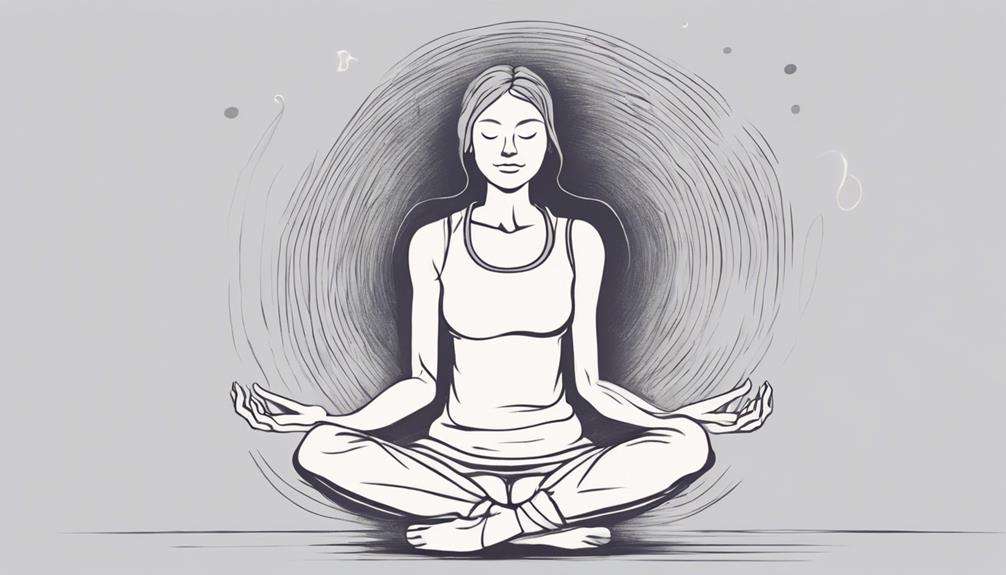Did you know that incorporating meditation techniques into your routine could potentially reduce migraine pain by up to 50%?
Discover how mindfulness practices can provide a natural and effective way to manage migraine symptoms without relying solely on medication.
By exploring the power of meditation in alleviating pain, you might find a valuable tool to enhance your overall well-being and quality of life.
Key Takeaways
- Meditation aids in recognizing and managing migraine triggers effectively.
- Regular meditation improves sleep quality, reducing the risk of migraines.
- Mindfulness practices empower proactive migraine symptom management.
- Meditation induces physiological changes to alleviate chemical imbalances triggering migraines.
Stress and Anxiety Management
Managing stress and anxiety through meditation techniques is crucial in alleviating migraine pain. Meditation has been shown to have a profound impact on individuals suffering from migraines. By practicing meditation regularly, individuals can effectively manage stress and anxiety, which are common triggers for migraines. Studies have indicated that meditation not only improves sleep quality but also enhances physiological responses to stress. Furthermore, combining stretches with meditation can lead to improved heart rate variability and promote positive feelings, contributing to overall well-being.
One of the key benefits of meditation in migraine management is its ability to inhibit the nervous system responsible for stress, anxiety, and tension. By calming this system through meditation, individuals can experience a reduction in migraine frequency and intensity. Meditation offers a holistic approach to addressing the root causes of migraines, providing a natural and effective way to alleviate symptoms and enhance overall quality of life.
Brain Development Support
Supporting brain development through meditation techniques involves enhancing grey matter volume in specific regions associated with emotion, perception, memory, and decision-making. Individuals with chronic migraines may exhibit reduced grey matter, but engaging in meditation practices like mindfulness meditation can help increase grey matter volume in these crucial brain areas. This increase in grey matter supports improved pain management and reduced pain sensitivity commonly experienced during migraines.
Meditation, particularly zen meditation, has been linked to thicker grey matter and decreased pain sensitivity, contributing to both brain development and pain relief. By positively impacting brain regions responsible for self-regulation, problem-solving, and working memory, regular meditation practice fosters overall brain development and function. Studies have also shown that meditation induces physiological changes in the brain, leading to enhanced neurotransmitter regulation and improved balance in brain chemistry. Embracing meditation techniques can therefore play a significant role in supporting brain development, alleviating migraine pain, and enhancing overall well-being.
Chemical Imbalance Help

Balancing neurotransmitters through meditation techniques can help address chemical imbalances associated with migraines. By engaging in meditation practices, you can effectively regulate neurotransmitters like dopamine, melatonin, and serotonin, which play crucial roles in migraine development. Meditation aids in reducing stress-related chemicals such as cortisol and norepinephrine, thereby restoring equilibrium in the brain and potentially alleviating migraine symptoms caused by chemical imbalances.
Zen meditation, specifically, has shown promising results in correcting chemical imbalances linked to migraines. Studies suggest that practicing Zen meditation can lead to thicker grey matter in the brain and decreased sensitivity to pain, both of which contribute to mitigating migraine severity. Moreover, meditation positively influences brain regions responsible for self-regulation, problem-solving, and working memory, all vital for addressing chemical imbalances that may exacerbate migraine attacks.
In essence, incorporating meditation into your routine can offer a comprehensive approach to managing migraines by promoting overall brain health, regulating neurotransmitters, and potentially reducing the impact of chemical imbalances on migraine frequency and intensity.
Enhanced Self-Awareness
Enhance your self-awareness through meditation to effectively recognize early signs of an impending migraine. Mindfulness practices can help you become more attuned to your body and mind, aiding in the identification of triggers, behaviors, and stressors that may contribute to migraine episodes. By increasing self-awareness, you empower yourself to proactively manage and alleviate migraine symptoms before they escalate.
Meditation plays a crucial role in honing your ability to detect subtle changes in your body, enabling you to implement early intervention strategies for migraines. Through the self-awareness cultivated by meditation, you can make lifestyle adjustments that promote better migraine management, leading to improved overall well-being.
- Mindfulness practices enhance self-awareness of migraine triggers.
- Increased self-awareness allows for proactive management of migraine symptoms.
- Meditation aids in the early detection of subtle changes signaling an impending migraine.
- Self-awareness through meditation empowers lifestyle adjustments for better migraine management.
- Recognizing stressors through meditation enables effective migraine intervention strategies.
Improved Sleep Patterns

To optimize your migraine management strategy, consider how meditation techniques can positively impact your sleep patterns, potentially reducing the risk of sleep disturbances that may trigger migraines.
Meditation techniques, such as mindfulness meditation, have been shown to improve sleep quality by promoting relaxation and calming the mind and body before bedtime. Consistent practice of mindfulness meditation can help regulate sleep patterns, leading to deeper and more restful sleep.
By incorporating meditation into your nightly routine, you may experience reduced fatigue and stress, which are common factors contributing to migraine onset. Research suggests that meditation can positively impact sleep architecture, enhancing the body's natural sleep-wake cycle.
This means that by practicing meditation regularly, you can't only enjoy better sleep but also reduce the risk of experiencing disruptions in your sleep that could potentially trigger migraines. Embracing meditation as part of your migraine management plan may offer significant benefits in improving your overall sleep patterns and reducing the likelihood of migraine attacks.
Frequently Asked Questions
How to Cure Migraine Through Meditation?
To cure migraines through meditation, start with mindful breathing to calm your mind. Visualize peaceful scenes, practice progressive muscle relaxation. Use guided imagery or a body scan. Experiment with mantra meditation, chakra balancing, self-hypnosis, or loving kindness meditation. Try yoga poses for holistic relief.
Is There a Pressure Point to Stop a Migraine?
To stop a migraine, apply pressure to the Liang Quan acupressure point. This technique, a natural remedy for headache relief, is an alternative medicine approach. It aids in pain management, promotes the mind-body connection, and reduces stress through holistic self-care practices.
How Do You Get Instant Relief From a Severe Migraine?
To get instant relief from a severe migraine, try deep breathing exercises, mindfulness practice, guided imagery, progressive muscle relaxation, acupressure techniques, herbal remedies, aromatherapy benefits, yoga poses, biofeedback therapy, and self-care strategies. These methods offer quick relief and holistic benefits.
What Is an Effective Relaxation Technique for Treating Migraines?
To find relaxation for migraines, practice mindful breathing, progressive relaxation, and visualization exercises. Engage in guided imagery, body scans, deep breathing, and muscle relaxation. Prioritize stress reduction for a calm mind and potential headache relief.
Conclusion
In conclusion, if you want to continue suffering from debilitating migraines, by all means, avoid trying meditation techniques. Who needs improved quality of life, reduced pain perception, and overall well-being anyway? Stick to your current methods of coping with migraines and ignore the countless studies showing the benefits of mindfulness practices.
After all, who needs relief when you can just keep popping painkillers and suffering in silence?






